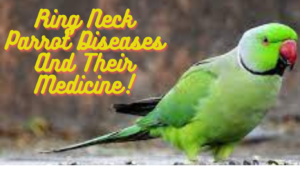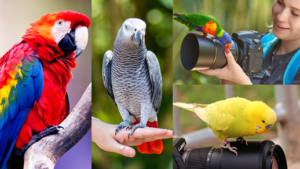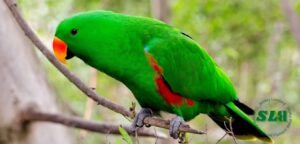
Proper care, hygiene, and early detection of symptoms are crucial in managing and preventing diseases in ring-neck parrots. Regular veterinary check-ups, a balanced diet, and a clean living environment contribute significantly to the overall well-being of these beautiful birds. Remember that specific diseases may require unique treatment approaches; consulting with a qualified avian veterinarian is always the best course of action.
Common Ring-Neck Parrot Diseases:
1.Psittacosis (Chlamydiosis):
Symptoms: Respiratory distress, lethargy, eye discharge, and weight loss.
Treatment: Antibiotics such as doxycycline or tetracycline. Quarantine affected birds.
- Aspergillosis:
Symptoms: Difficulty breathing, lethargy, and weight loss.
Treatment: Antifungal medications like itraconazole or amphotericin B. Improve ventilation in the living environment.
- Polyoma Virus:
Symptoms: Feather abnormalities, weight loss, and sudden death in young birds.
Treatment: Supportive care; no specific antiviral treatment. Vaccination for prevention.
- Psittacine Beak and Feather Disease (PBFD):
Symptoms: Feather loss, beak, and claw abnormalities.
Treatment: No cure; focus on preventing the spread by maintaining good hygiene and separating infected birds.
- Bacterial Infections:
Symptoms: Various, depending on the specific bacteria involved.
Treatment: Antibiotics prescribed by a veterinarian after identifying the specific bacteria through tests.
- Egg-Laying Issues:
Symptoms: Egg binding, prolapsed vent.
Treatment: Warm baths, calcium supplements, and in severe cases, surgical intervention.
General Treatment Guidelines:
Isolation and Quarantine:
Separate sick birds from healthy ones to prevent the spread of contagious diseases.
Nutrition:
Provide a balanced and nutritious diet to support the bird’s immune system.
Hygiene:
Maintain a clean environment to reduce the risk of infections.
Veterinary Consultation:
Seek professional help for accurate diagnosis and appropriate treatment plans.
Medication:
Administer prescribed medications as directed by the veterinarian.
Prevention:
Vaccinate birds against preventable diseases.
Regular health check-ups.
Conclusion:
Proper care, hygiene, and early detection of symptoms are crucial in managing and preventing diseases in ring-neck parrots. Regular veterinary check-ups, a balanced diet, and a clean living environment contribute significantly to the overall well-being of these beautiful birds. Remember that specific diseases may require unique treatment approaches; consulting with a qualified avian veterinarian is always the best course of action.

